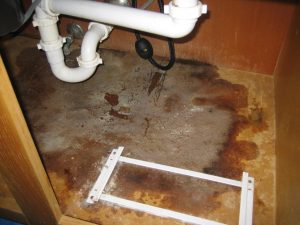What to Know About Homeowners Insurance and Water Damage
If you own your own home, then chances are you’re at least a little familiar with homeowners insurance. If you financed the purchase of your home, your lender may have made insurance a mandatory part of your mortgage.
You might have simply gotten the basic policy when you closed on your home, but have you looked at it lately?
Are you aware of what your insurance will cover—and more importantly, what it will NOT cover?
How Significant Can Water Damage Be to a Home?
Water damage can occur in a number of scenarios, and even the smallest problem can become an expensive one if it’s not discovered in a timely manner. A leaking refrigerator, for instance, could be seeping water into your flooring—and below into your basement—for months before you find the issue.

Plumbing leaks and problems could also go undetected for longer than it should. By the time you find the problem, you could have serious water damage on your hands, including buckled flooring, warped walls, and mold damage.
The average homeowner spends an average of $2,588 to fix or restore water damage in their home. That includes not only bringing in professionals to try and dry up any water or wet materials, but also any carpentry, masonry, or other contracting necessary to repair or rebuild.
That might not seem like a lot of money, but homeowners insurance doesn’t always cover water damage—which means you might be stuck with the bill.
What Does Homeowners Insurance Cover?
One of the more critical things to understand about homeowners insurance is what types of water damage a policy will cover. The phrase most often used is “sudden and accidental”. That means if you have a water heater pipe suddenly burst and spray water everywhere, soaking into the wall and flooring, your policy may cover the repairs under what’s called “dwelling coverage.”
Your policy may also have personal property coverage, which means if that water heater pipe bursting also damages your favorite recliner or a stack of books, replacing those items may also be covered.
Before your policy covers anything, you’ll probably need to pay a deductible. It’s smart to know what your deductible is now before anything happens. Some homeowners like to keep an amount of money equal to the deductible amount tucked away in a savings account. Depending on how much the deductible is, you might still end up paying a lot of money out of pocket even if your water damage is covered.
Water damage covered by snow, ice, or sleet is usually covered as well. Too much snow on certain types of roofs can cause caving or leaking; that means you could have damage in your walls too—and that can be a costly repair.
What Does Homeowners Insurance NOT Cover?

Generally speaking, the water damage that is a result of poor maintenance or neglect isn’t covered. If you’ve been meaning to fix that leaky toilet in your bathroom but now there is water damage in your flooring, chances are that won’t be covered. Sewer backup, such as when city sewage pipes back up into your home, is also not usually part of a policy.
One big type of disaster that isn’t covered is a flood. If you live in a flood-prone area, called a flood plain, you’ll need to purchase a specific flood policy. You should have been notified at the time you purchased your home if you live in a flood plain; if you’re not sure, you can contact your county assessor to find out if your home is located in one.
Overflow and discharge are also things that may not be covered. If your bathtub overflows, for instance, or your washing machine hose is seeping water behind your appliances. That’s generally not covered under a homeowners policy. If your overflow is caused by something sudden and accidental, however, that would be covered.
Final Thoughts
Once you understand the terms that your insurance company will use—and how they define those terms. You can better understand what will be covered and what isn’t.
The best time to find out what your policy will cover is before you have water damage in your home. Take the time to look at your policy, and make sure to ask your insurance agent about anything. That you don’t understand, or anything you have concerns about.
If you need additional coverage because of natural disasters that happen in your area. It’s much better to get it now—before you need it.
The post What to Know About Homeowners Insurance and Water Damage appeared first on RestorationEze.

